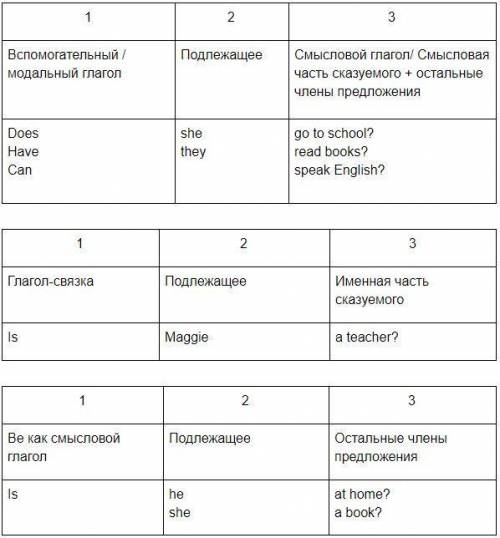1.●В утвердительном предложении английского языка порядок слов следующий:
4 1 2 3 4
Обстоятельство------Подлежащее-------Сказуемое-------Дополнение-------Обстоятельство
(Every day) You write a letter every day.
Необходимо понять то, что 1, 2 и 3 компоненты могут идти только в такой последовательности, а 4 компонент – подвижен, он может стоять в конце предложения или в самом начале.
Безличные предложения русского языка также сохраняют указанную выше структуру, а отсутствующее подлежащее заменяется местоимением it:
Холодно. - It is cold.
Поздно. - It is late.
●Отрицательное предложение в английском языке образуется путем добавления отрицательной частицы not после вс глагола:
1 2 3 4
Подлежащее---- вс глагол----not---Сказуемое----Дополнение----Обстоятельство
I do not smoke.
Я не курю.
Вс глагол меняется в зависимости от того, в каком времени употребляется сказуемое в утвердительном предложении. Вс глагол никогда не переводится на русский язык, он потому и вс что только образовать отрицательную форму английского глагола и показать время. Смысловую нагрузку несёт – основной глагол – сказуемое (как обозначено в схеме), его называют ещё смысловой глагол.
●Существует несколько типов вопросительных предложений в английском языке, два из них являются основными – это специальный и общий вопрос. Изобразим структуру этих типов вопросов схематично:
1 2 3 4
Вопросительное слово--вс глагол--Подлежащее--Сказуемое--Дополнение--Обстоятельство?
Do you live ---- in Moscow?
Where do you live ----- ----- ?
2. общий вопрос – это вопрос, начинающийся со вс глагола и предполагающий ответ «да» или «нет». В вопросах такого вида, как видно из схемы, на первое место ставится вс глагол, после которого следует обычный порядок слов. Вс глагол никогда не переводится на русский язык, он потому и вс что только образовать отрицательную и вопросительную форму английского глагола и показать время.
Специальный вопрос строится на базе общего, начинается со специального вопросительного слова (what, where, how, when, why) и используется, чтобы узнать какие-либо детали, подробности чего-либо
○1 Общие вопросы (General Questions)
Данный тип вопросов, который еще называют Yes – No question, предполагает подтвердить или опровергнуть содержание высказывания. То есть на вопрос можно ответить кратко да или нет.
Порядок слов в данном типе вопросов может быть следующим:
○2. Специальные вопросы (Special Questions)
Специальный вопрос – это вопрос к какому-то определенному члену предложения. Такой тип вопросов также еще называют Wh-question,а служит он для выяснения подробной информации. На такой вопрос нельзя просто ответить “да” или “нет”.
К вопросительным словам относятся:
· what? – что?
· who? – кто?
· when? – когда?
· where? – где?
· why? – почему?
· which? – который?
· whose? – чей?
Примеры специальных вопросов в Present Simple:


2. A barrister …should not work in a court without a brief from a solicitor.
3. The publisher must… get the Proprietors’ consent in writing beforehand.
4. People should… learn more about their rights so that they know what laws protect them from abuse.
5. Some companies may… be subject to enormous claims.
6. Self-employed barristers work in offices called chambers, and can… have their own office or share one with other barristers
7. In Europe, most countries insist that the citizens who keep wealth outside the territory where they live will have… to pay tax on it, sooner or later.